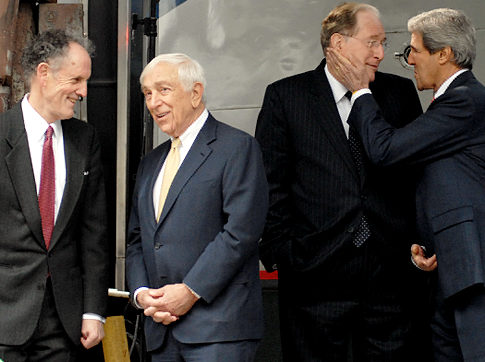In February, President Obama released his transportation plan, which included the launch of a national infrastructure bank. The next month, Sens. John Kerry (D-MA), Kay Bailey Hutchison (R-TX) and Mark Warner (D-VA) introduced a bill to create a similar bank, but with some key distinctions. And yesterday, Sens. Jay Rockefeller (D-WV) and Frank Lautenberg (D-NJ), leaders on the Commerce Committee, announced that they’re sponsoring legislation that would do nearly the same thing. So what’s the difference between all these different proposals?

Yesterday's Rockefeller/Lautenberg proposal closely mirrors the administration plan, with one key difference: Obama’s plan would authorize $5 billion a year for the next six years for an infrastructure bank. The Senators keep the same yearly dollar amount but cap their plan for a new infrastructure investment fund – which they avoid calling a bank – at two years, shrewdly sunsetting the bill soon after Obama’s first term ends, just in case he’s not re-elected.
After all, their version of the bill, like the president’s, would house this infrastructure “fund” within USDOT. Reformers in favor of an I-bank had wanted to see it independent of the administration, as Kerry’s proposal would have it.
Scott Thomasson, an expert on the infrastructure bank proposals at the Progressive Policy Institute, said one of the key elements of a national infrastructure bank is political independence in project selection.
[The Rockefeller/Lautenberg proposal] turns the idea of an independent bank upside-down, and would simply shift the discretion for those infamous ‘earmark’ projects from Congress to the executive branch. Senators Rockefeller and Lautenberg may think that's a good idea now, while they like the people running DOT, but they may not like the results as much under another administration. Perhaps that's why they only authorize funding for two years.
Sen. Kerry’s proposal also differs from the president’s by eliminating the grant program, holding the new bank exclusively to loans and loan guarantees. Kerry’s bill authorizes only $10 billion as seed money and then the bank self-sustains with loan repayment and interest. Meanwhile, the Lautenberg/Rockefeller proposal allocates $600 million a year for grants.
There’s a lot to be said for grantmaking authority, of course. Not all worthy transportation projects can be counted on to yield monetary returns on investment. Some good projects pay for themselves in environmental impact or equity for low-income people or public health. Try using that to repay a bank loan.
But, in the current fiscal environment, Sen. Kerry was probably wise to dial back the plan. He was able to get a Republican co-sponsor for his (which Rockefeller and Lautenberg don’t appear to have achieved) and is pitching his bill as a fiscally sane way to use $10 billion to leverage an estimated $600 billion in private investment.
In addition, the Lautenberg/Rockefeller bill would allow the federal government to fund up to 70 percent of a project, with just a 30 percent match that the locality comes up with through private investment. In the case of grants, it’s up to an 80 percent match. And for feasibility studies and planning, the federal government will foot the entire bill. (The Kerry bill caps out at a 50 percent match.)
“A lower cap forces developers to exhaust other avenues of financing before applying for loans or grants,” Thomasson said, “which applies a powerful market test to projects before the application is even submitted.”
Again, not all worthwhile projects can withstand a market test, so we’re sympathetic to the goals of the Obama/Rockefeller/Lautenberg line of reasoning. But if you’re looking for a bill to sell to Republicans these days, look to Kerry’s version.
The new bill leaves open the possibility of the fund expanding its scope to include other kinds of infrastructure projects, such as telecommunications, energy, and water projects in the future. That's one place it agrees with Kerry, who also proposed that the bank have a broad scope, and against Obama, whose I-bank plan is strictly for transportation.
Still, it’s hard not to see this bill as a competitor to Kerry’s. Sure, it’s possible to set up Kerry’s infrastructure bank and Lautenberg/Rockefeller’s infrastructure fund and they co-exist peacefully. But that kind of redundancy just doesn’t make sense. Meanwhile, what of Sen. Boxer’s pleas for a stronger TIFIA, and the president’s desire to see TIGER expanded?
For now, all sides are playing nice, but Kerry spokesperson Jodi Seth, in a statement to Streetsblog, made it clear that Kerry’s going to fight for his idea:
Obviously we welcome this new bill which underscores the growing consensus that existing infrastructure funding mechanisms aren’t sufficient. Both funding and Republican support are incredibly difficult to find in today’s budget atmosphere, which is one reason the Kerry-Hutchison approach creating an infrastructure bank with minimal federal funding has built momentum. We’ve drawn strong support from the Chamber of Commerce and conservative senators like Senators Graham. We’ve been coordinating closely with the White House, and believe we have the best odds of getting across the finish line this year in a very difficult legislative climate.





